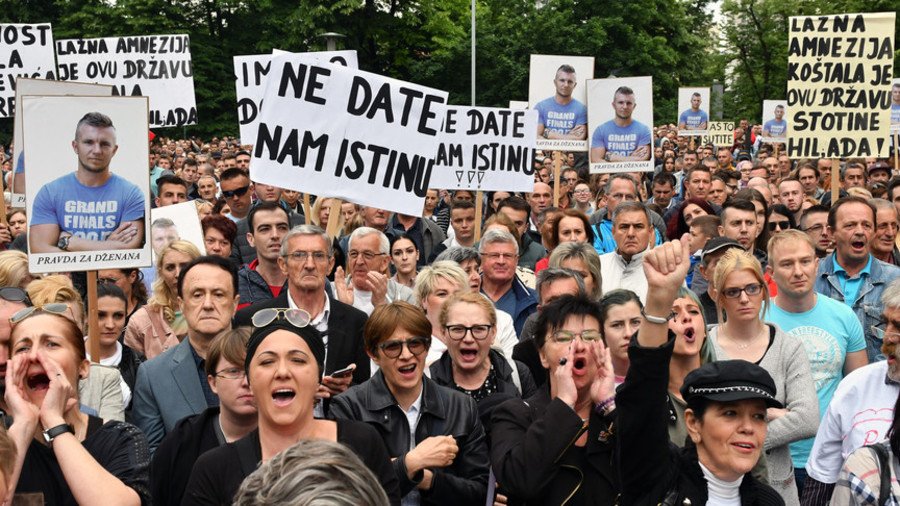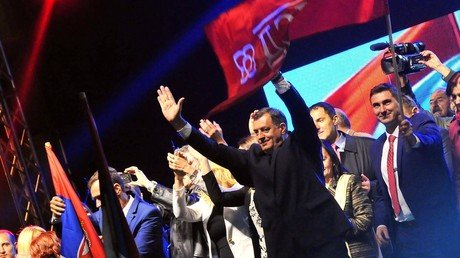Slavoj Zizek: Tragic deaths inspire a Bosnian miracle

The violent deaths of two young men have united Bosnians, crossing rigid ethnic lines. Could something finally be stirring in the divided Balkan country?
When we think of miracles and Bosnia, the first association that pops up is the appearance of the Virgin Mary a couple of decades ago in Medjugorje – an event that brought millions of pilgrims to the area.
However, a week ago, a much greater and more important miracle took place in Banja Luka, the capital of the Serb part of Bosnia ("Republika Srpska"), and then also in other Bosnian cities across the ethnic divide.
The miracle is not the elections which took place this Sunday. As usual, Bosnian elections (with all the accompanying irregularities) were marked by apathy and indifference, and just confirmed the tripartite division of the state along ethnic lines.
Today, the Serb part is more and more acting as a sovereign state, while in the Muslim Sarajevo, Islamization progresses, evidenced by how it's more and more difficult to get a beer in a restaurant or bar, among other things.
Meanwhile, a specific form of the much-publicized PPP (public-private partnership) is flourishing in all of Bosnia: local political elites intertwined with half-legal private businesses, their rule legitimized as protectors of ethnic entities (Bosnians, Serbs etc.) against the "enemy." In such a situation where poverty is everywhere and young people are migrating to Western Europe in search of jobs, nationalism thrives and defense of ethnic identity easily prevails over economic issues.
Lessons from past
The problem facing Bosnia is best exemplified by what took place a couple of years ago in Croatia. There, two public protest gatherings were announced: trade unions called for a protest against exploding unemployment and poverty (felt very much by ordinary people). At the same time, rightist nationalists announced a gathering in order to protest the re-introduction of the official status of Cyrillic writing in Vukovar (because of the Serb minority there).
Of course, at the first gathering, a couple of hundred people came, and to the second gathering, over 100,000 people came. Poverty was experienced as a daily life problem much more than the Cyrillic threat by ordinary people, but nonetheless trade unions failed to mobilize the masses.
Wise commentators like to evoke such stories to cynically mock leftist claims that our goal should be to defeat local nationalism and to bring about a transnational coalition of those who are manipulated and exploited by the ruling ethnic elites. They patiently explain how, especially in an area like the Balkans, "irrational" ethnic hatred runs all too deep to be overcome by "rational" economic concerns – meaning the transnational coalition of the exploited is a miracle that will never happen.
Well, suddenly this miracle is happening now. And it makes Medjugorje pale by comparison.
Human toll
David Dragicevic, a young Serb-Bosnian hacker, disappeared in the night from March 17 to March 18 this year, and his body was found in the vicinity of Banja Luka on March 24; it was clear from his heavily disfigured body that he was killed by protracted brutal torture.
From March 26, daily protests have taken place in the main square of Banja Luka, organized by his father Davor under the title "Justice for David." Police first declared David's death a suicide, and only after strong public pressure began to investigate it as a case of murder, but with no results yet.
Eventually, it became clear that David had discovered traces of corruption and other criminal activities of the ruling clique. So he had to disappear.
A week ago, the continuous protests erupted into a large mass gathering, with tens of thousands participating, and dozens of buses bringing people from all of Republika Srpska into Banja Luka. The ruling clique reacted with panic: thousands of policemen controlled the streets and blocked entry to the city.
Now comes the true miracle. Unexpectedly, in a wonderful display of trans-ethnic solidarity, similar gatherings took place in other Bosnian cities where Muslims are a majority. In Sarajevo, the capital of Bosnia, hundreds demanded justice for a similar case that happened in their midst: the death of Dzenan Memic, who disappeared in the night of February 8 to February 9, 2016, which was never seriously investigated, although his body was also disfigured by traces of torture.
Alone together
Protesters in Banja Luka, Sarajevo, and other Bosnian cities exchanged messages and emphasized their solidarity across ethnic divides, since they all share the same fate of being controlled by corrupted PPP elites.
So, finally, they became fully aware that the true threat does not come from other ethnic groups but from the corruption in their own group, and that they can get rid of this malignant tumor only by acting together. And then the impossible and "unimaginable" (for cynical realists) happened.
Of course, one should not expect too much from such explosions. A similar trans-ethnic movement against economic poverty already took place a couple of years ago, in an echo of the Arab Spring, and gradually dwindled.
However, the fire continues to burn beneath the surface, and this fire is the only beacon of hope in Bosnia. In this, it reconfirms the truth of Abraham Lincoln's old saying: You can deceive some people all the time, you can deceive all the people for some time, but you cannot deceive all the people all the time.
Think your friends would be interested? Share this story!
Subscribe to RT newsletter to get stories the mainstream media won’t tell you.
The statements, views and opinions expressed in this column are solely those of the author and do not necessarily represent those of RT.


















